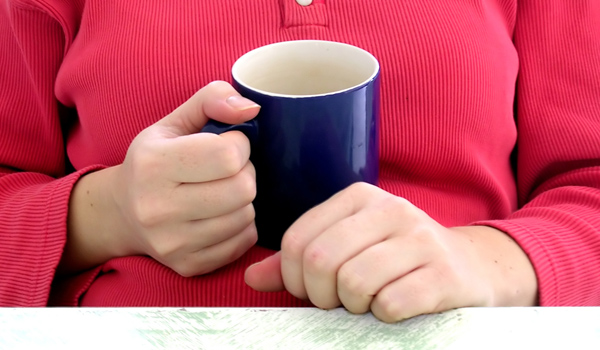
Why Does Room-Temperature Coffee Taste So Bad?

"My coffee has become tepid." To a coffee drinker, is there any realization more sigh-inducing?
It is strange, when you think about it, that a piping hot cup o' joe can be so delicious, and that iced coffee can be very nice, too, but that between those temperature extremes there lies an unpleasant no-man's-land of bitterness. Room-temperature coffee is regularly tolerated by us all — ok, us "addicts" — because we can't function without the caffeine. But why does it taste so bad?
Biologists have only recently started getting a handle on how and why temperature affects the taste of food and beverages, and no research has been conducted specifically regarding coffee. But there are three main theories; the first holds that lukewarm coffee tastes bad because cavemen didn't have refrigerators. Allow us to explain.
Karel Talavera of the Laboratory of Ion Channel Research in Cuba has studied the way that taste receptors inside our taste buds respond to molecules at different temperatures. He and his colleagues have found that certain taste receptors are most sensitive to food molecules that are in the 20 to 35 degree Celsius (68 to 95 degree Fahrenheit) range — in other words, molecules that are at or just above room temperature. The taste receptors in question don't always register molecules that are much hotter or colder than this range, and thus we don't taste them.
"This is still an obscure phenomenon that we cannot explain, but that could fit to the fact that taste perception does decrease above a certain temperature," Talavera told Life's Little Mysteries. In short, hot coffee (around 170 degrees F) may seem less bitter than room-temperature coffee (73 degree F) because our bitter taste receptors aren't as sensitive to bitter molecules in the coffee when those molecules are hot. [Coffee's Mysterious Benefits Mount]
What does that have to do with cavemen? According to Talavera, biological processes such as our sensory systems tend to be designed by evolution to perform most effectively at the temperatures we are typically exposed to. "Our ancestors did not eat food at extreme temperatures," he said. Their meals consisted of mostly foraged berries and freshly hunted meat in the 20 to 37 degree Celsius range — almost exactly the window in which our taste buds are most sensitive. Because piping hot or ice-cold coffee falls outside this realm of maximum taste, our taste buds don't sense the drink's true bitterness.
However, the temperature-dependence effect observed by Talavera and colleagues is more pronounced for sweet taste receptors than bitter ones, and so it may not be the only factor at work. Some researchers think tepid coffee's bitterness has more to do with smell than taste. "Odors influence coffee flavor very strongly, and it is easy to go from sublime to horrible," Paul Breslin, an experimental psychologist who studies taste perception at Rutgers University, wrote in an email. Even very bitter coffee, such as espresso, tastes great when hot because of its pleasant aroma, he pointed out.
Sign up for the Live Science daily newsletter now
Get the world’s most fascinating discoveries delivered straight to your inbox.
And according to Barry Green, a taste perception scientist at Yale University, hot coffee releases more aromatic compounds than room-temperature coffee, so it has a greater chance of impacting taste. He also said that milk, coffee's frequent companion, tastes worse at room temperature, and a combination of these factors probably explains the nearly universal opinion that lukewarm java leaves something to be desired.
One last theory holds that hot coffee's heat could be distracting us from its strong flavor. As Breslin put it, "It is possible that an attentional mechanism is at work. You do not think about how bitter or sweet [coffee] is when it is hot or cold. Hot coffee may force you to think about temperature, which is a bit of a distraction from its bitterness."
None of the researchers profess to fully understand coffee's temperature-dependent deliciousness, but it seems to be at least slightly a matter of opinion. In a small survey of 42 people by Life's Little Mysteries, 79 percent said they like hot coffee best, while 19 percent prefer iced coffee. Though one survey respondent said she would "rather eat glass" than drink room-temperature coffee, another person actually reported liking lukewarm coffee best of all.
Follow Natalie Wolchover on Twitter @nattyover. Follow Life's Little Mysteries on Twitter @llmysteries, then join us on Facebook.
Natalie Wolchover was a staff writer for Live Science from 2010 to 2012 and is currently a senior physics writer and editor for Quanta Magazine. She holds a bachelor's degree in physics from Tufts University and has studied physics at the University of California, Berkeley. Along with the staff of Quanta, Wolchover won the 2022 Pulitzer Prize for explanatory writing for her work on the building of the James Webb Space Telescope. Her work has also appeared in the The Best American Science and Nature Writing and The Best Writing on Mathematics, Nature, The New Yorker and Popular Science. She was the 2016 winner of the Evert Clark/Seth Payne Award, an annual prize for young science journalists, as well as the winner of the 2017 Science Communication Award for the American Institute of Physics.










